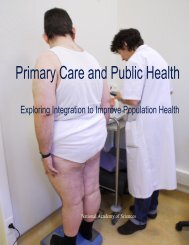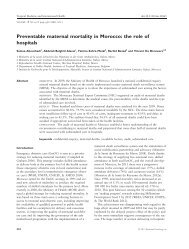Preventing Childhood Obesity - Evidence Policy and Practice.pdf
Preventing Childhood Obesity - Evidence Policy and Practice.pdf
Preventing Childhood Obesity - Evidence Policy and Practice.pdf
You also want an ePaper? Increase the reach of your titles
YUMPU automatically turns print PDFs into web optimized ePapers that Google loves.
Chapter 3<br />
should liaise with schools <strong>and</strong> community services to<br />
ensure that their messages are given prominence.<br />
Health care staff also have a role in monitoring<br />
children ’ s growth to recognize early signs of “ mis -<br />
nourishment ” , including stunting <strong>and</strong> overweight,<br />
<strong>and</strong> to provide appropriate responses. The contacts<br />
between parents <strong>and</strong> the maternal/child health nurses<br />
are especially important “ learning moments ” <strong>and</strong><br />
should be utilised to encourage breastfeeding <strong>and</strong><br />
teach parents about appropriate growth trajectories<br />
<strong>and</strong> feeding practices for their children. The evidence<br />
on effective primary care management is very limited<br />
(as outlined in Chapter 12 ) <strong>and</strong> many of the existing<br />
structures in primary care, especially the funding<br />
structures that dictate the short consultation periods,<br />
conspire against this setting being used to its full<br />
potential (see Chapter 31 ).<br />
Community-wide approaches<br />
Enabling environments must encompass all communities<br />
<strong>and</strong> must also operate within a given community,<br />
affecting transport policies, urban design policies<br />
<strong>and</strong> access to healthy diets. Community - wide<br />
approaches play an important role in providing the<br />
broader approach, <strong>and</strong> these are covered in more<br />
detail in Chapters 7 , 26 , 27 . However, it is worth<br />
emphasizing the need to ensure adequate access to<br />
healthy foods for low - income families. This may<br />
require programs <strong>and</strong> policies to ensure that healthy<br />
food is more readily available, affordable <strong>and</strong> better<br />
promoted than the unhealthy alternatives.<br />
National p olicies<br />
While there are several key players in obesity prevention<br />
(governments, international organizations, the<br />
private sector <strong>and</strong> civil society/non - governmental<br />
organizations), governments need to take the lead <strong>and</strong><br />
to drive the policy changes. Each country should select<br />
a mix of promising policies <strong>and</strong> actions that are in<br />
accord with national capabilities, laws <strong>and</strong> economic<br />
realities. 13 Ministries of health have a crucial convening<br />
role in bringing together other ministries that are<br />
needed for effective policy design <strong>and</strong> implementation.<br />
However, it is important to realize that while<br />
health usually takes a large slice of national budget,<br />
ministers of health are not usually the most powerful<br />
members of cabinet. Governments need to work<br />
together with the private sector, health professional<br />
bodies, consumer groups, academics, the research<br />
community <strong>and</strong> other non - governmental bodies if<br />
sustained progress is to occur.<br />
National policies <strong>and</strong> programs should explicitly<br />
address equality <strong>and</strong> diminish disparities by focusing<br />
on the needs of the more disadvantaged communities<br />
<strong>and</strong> population groups. Furthermore, since women<br />
generally make decisions about household nutrition,<br />
strategies need to be gender sensitive. Continued<br />
support for the full implementation of the WHO -<br />
UNICEF Code of Marketing of Breast Milk Substitutes<br />
is vital in all countries. Recommendations for local<br />
<strong>and</strong> central governments are delineated in the WHO<br />
Global Strategy on Diet, Physical Activity <strong>and</strong> Health<br />
(DPAS) 14 <strong>and</strong>, in addition to the specific measures to<br />
address childhood obesity, they also have a fundamental<br />
role in providing the support strategies for<br />
effective obesity prevention, as shown in the box<br />
below.<br />
Support f unctions for<br />
g overnments in a ddition to<br />
s pecific o besity p revention<br />
i nterventions<br />
• Monitoring programs on outcomes (obesity), <strong>and</strong><br />
determinants (e.g., behaviors <strong>and</strong> environments)<br />
should report to a parliamentary scrutiny committee<br />
or an “ obesity observatory ” .<br />
• Coordination to ensure cross - departmental, cross -<br />
sectoral polices can be implemented <strong>and</strong> these<br />
should managed centrally by government but monitored<br />
by a separate agency.<br />
• Capacity should be built at national <strong>and</strong> at local<br />
levels, through training programs <strong>and</strong> other support<br />
structures <strong>and</strong> funding.<br />
• State support for commerce (e.g. food enterprises,<br />
agricultural enterprises) should include health<br />
criteria.<br />
• Political donations from food companies should be<br />
restricted.<br />
• Access to <strong>and</strong> affordability of fruits <strong>and</strong> vegetables<br />
should be improved, especially for low - income <strong>and</strong><br />
disadvantaged population groups.<br />
• National governments should support WHO moves<br />
to ensure that all UN agencies have policies that are<br />
consistent with the Global Strategy.<br />
26

















